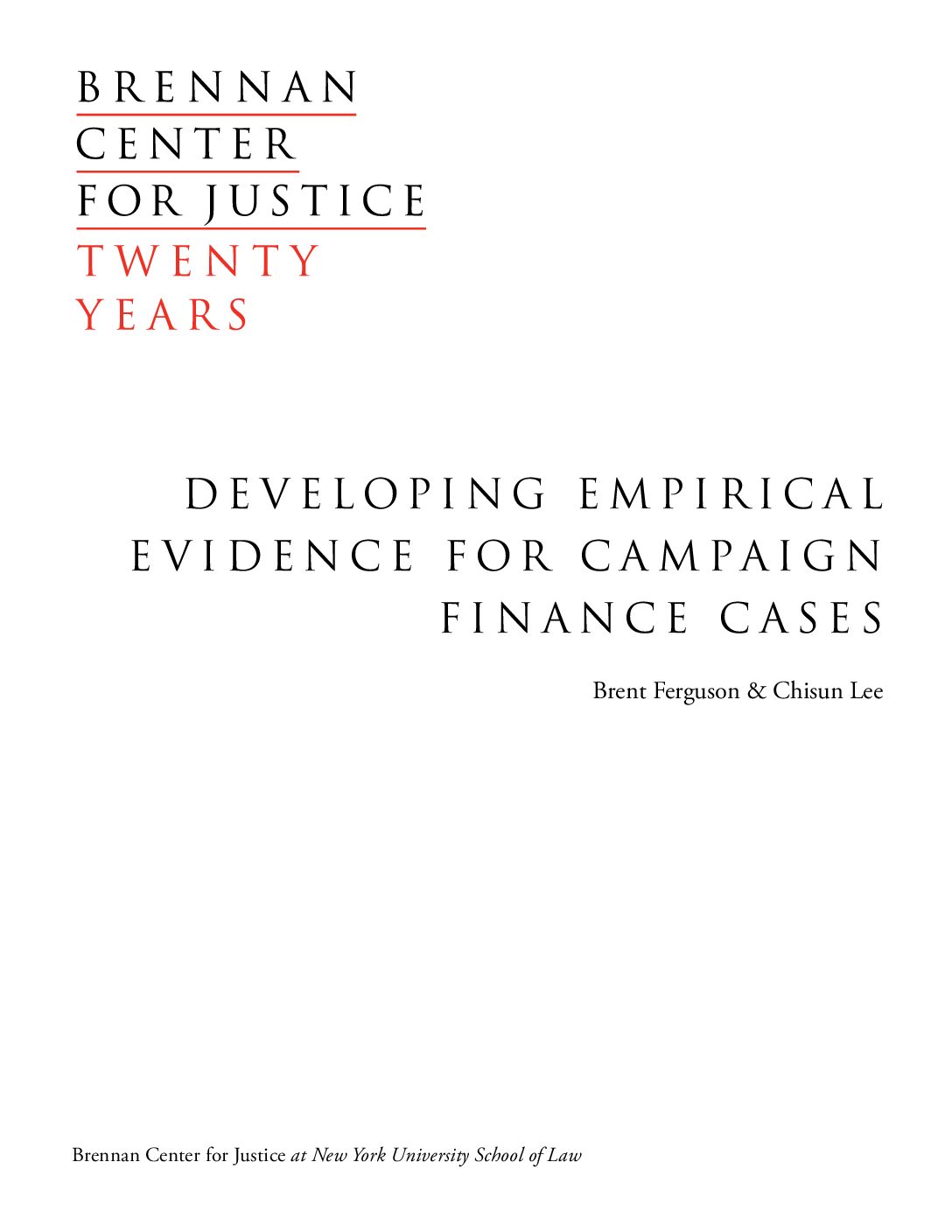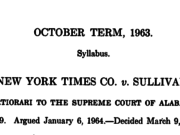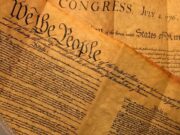The Brennan Center for Justice recently released a report entitled “Developing Empirical Evidence for Campaign Finance Cases.” Written by Brent Ferguson and Chisun Lee – a Counsel and Senior Counsel, respectively, at Brennan – their paper serves three basic functions. It is part examination of the current landscape surrounding campaign finance jurisprudence, part survey of previous studies on the effects of campaign finance laws and how the Court used that evidence in its past rulings, and part call to arms for pro-regulation activists hoping to have an impact on future campaign finance battles in the courts.
The premise of the paper is simple: the current vacancy on the Supreme Court provides a prime opportunity to reshape future free speech jurisprudence, but in order to fully capitalize on this occurrence, it is not enough to simply appoint like-minded justices to the Court. Rather, advocates of greater speech regulation must also develop techniques to produce empirical research supporting their claims about how our campaign finance system operates: “This research will have to be strongly credible, closely relevant, and sufficiently comprehensive in scope to stand a chance of persuading even a friendly Court to overturn or sidestep precedent,” the authors explain.
Ferguson and Lee argue that the Court’s use of empirical evidence in evaluating campaign finance regulations varies from case to case, and that most of the deregulatory decisions since 2007 have been particularly scant in their use of data. Thus, the authors reason, by countering particular arguments and assumptions from those decisions with voluminous social science research, pro-regulation activists can persuade a new Court to re-evaluate past decisions nullifying various political speech regulations.
Ferguson and Lee are correct about the value of research. It is always good to encourage greater study on issues of public importance and to test the veracity of commonly-held assumptions and viewpoints. The Center for Competitive Politics certainly supports and pursues this goal through its own research.
But their paper also provides vital lessons to supporters of free speech, insofar as it reveals how pro-regulation groups will seek to reframe the campaign finance debate going forward. The authors state that providing a lengthy list of supporting literature to reference and key questions to address will “aid not only litigants and courts as they consider new campaign finance cases, but also policy makers, as they seek to understand problems, craft the best solutions, and build records to defend those solutions against virtually inevitable constitutional challenges.”
The desire to create a blueprint for coordinating social science research with activism is nothing new. In fact, it is a strategy that supporters of free speech may be well-served by adopting. For those hoping to overturn widely-adopted – but still repressive – restrictions on free speech through the courts, the appeal of using both constitutional arguments as well as real-world evidence is obvious. As the authors observe, “the party attempting to invalidate a commonplace restriction may bear the evidentiary burden, rather than the party seeking to justify the law.”
One difficulty for First Amendment advocates is that many prominent voices in academia are ideologically opposed to a deregulated campaign finance system, and they may be more likely to write studies with that goal in mind. Brennan’s report itself suggests that the use of anecdotal evidence in court is sufficient to build a narrative of a political system “besieged by conflicts of interest.”
The good news is that introducing more empirical data can also undercut these points. Indeed, the paper seems overly optimistic that further research will surely reinforce existing “reformer” arguments that spending money to advance candidates and political opinions necessarily has a corrupting or otherwise negative impact on American democracy.
This is not the case. CCP’s own research has already addressed some of the questions posed by this report, such as whether tax-financing programs increase voter turnout, aggregate contribution limits prevent corruption, and independent spending improves electoral outcomes for favored candidates. If anything, greater research can help free speech advocates to correct misconceptions among the public about these complex issues that speech regulatory activists often exploit and reinforce in order to mobilize voters to their cause.
Finally, it is worth stating that, although empirical evidence is certainly an important resource for shaping campaign finance jurisprudence, it would be a mistake for restrictionists to completely dismiss the Court’s “principled” justifications for siding with free speech. As significant as real-world outcomes are, at a certain point they cannot outweigh basic liberties. The right to speak and participate in the electoral process is not contingent upon the political consequences of doing so, and the ability of a well-funded organization to run persuasive ads is not a justification for stifling that organization’s speech.
The Brennan Center’s report provides an interesting look at the mindset and strategy of those who would constrain free speech. The best way to ensure continued First Amendment protections is to adopt the paper’s advice and insights by conducting research that exposes the negative consequences of regulation and points out the shortcomings of supportive research. CCP will certainly continue to do its part by continuing to conduct and disseminate research on a variety of political speech topics.














